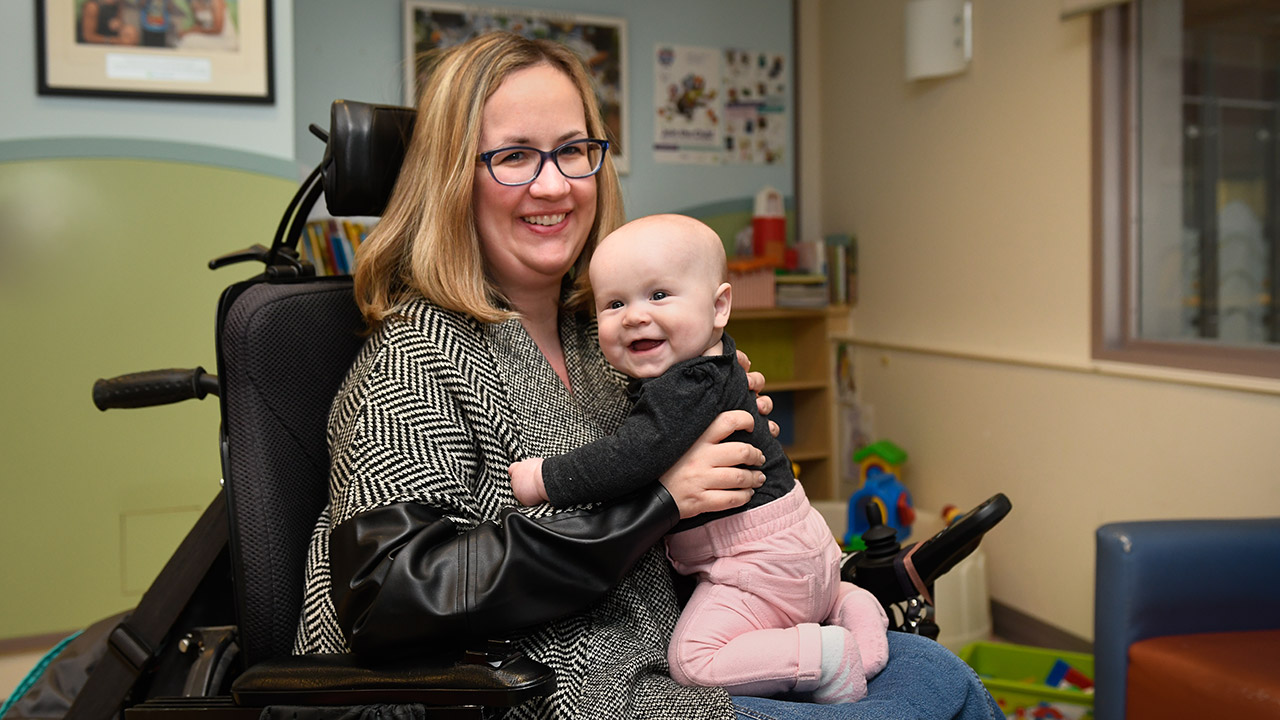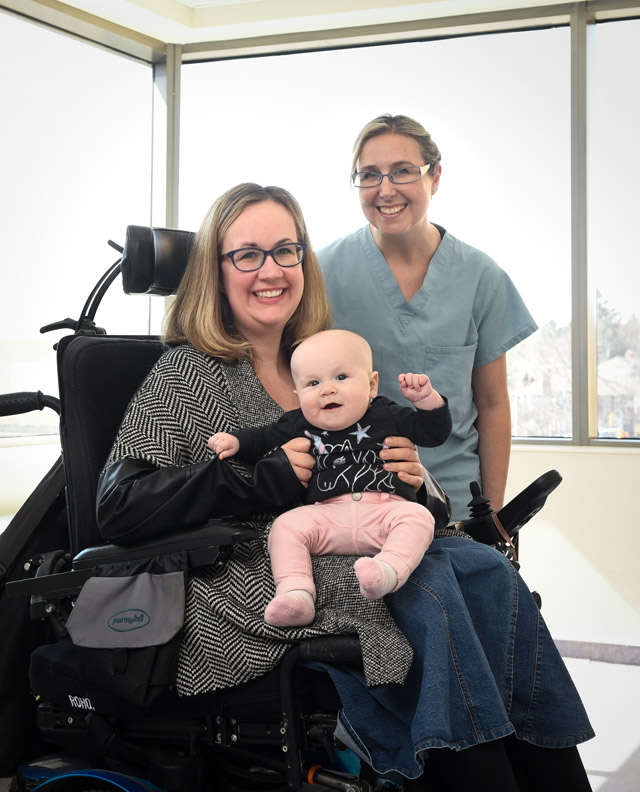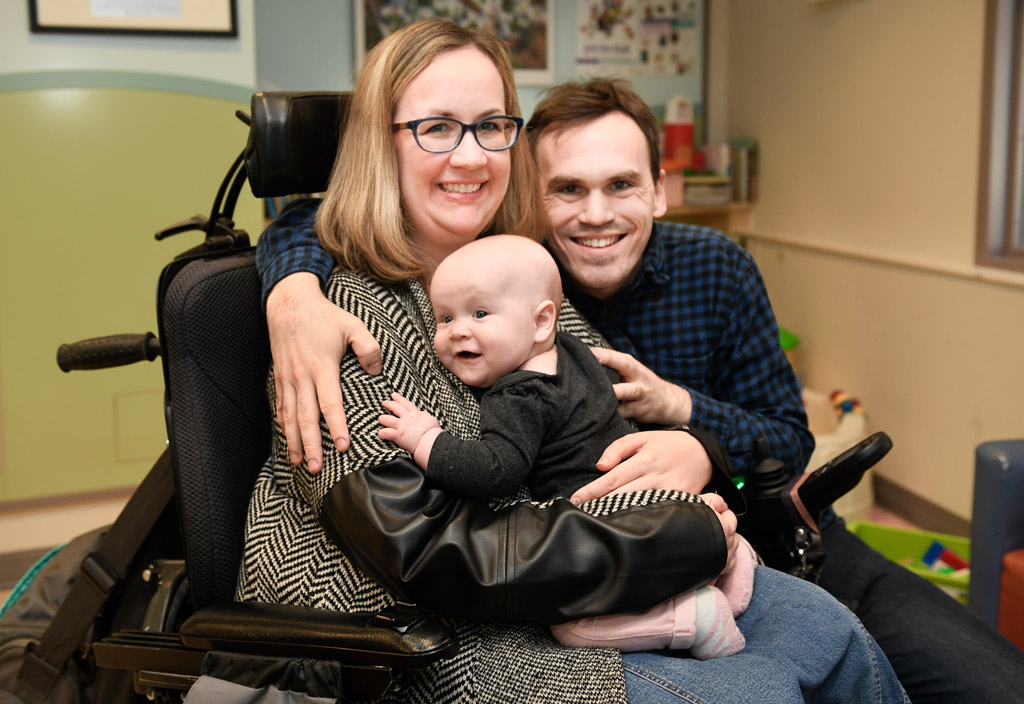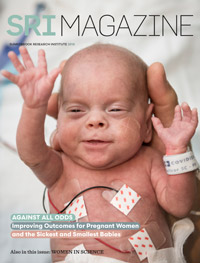A unique road to motherhood

Kaley Roosen shares her story of becoming a mom, from the uncertainty she encountered about whether her body would allow her to do it, to the joy she felt when she first cradled her daughter in her arms

Thanks to Sunnybrook’s Accessible Care Pregnancy Clinic, and despite doubt from society around her ability to be a mother, Kaley Roosen delivered her daughter, Gwendolyn, in October 2017. She says she lucked out with such a good baby.
Deciding whether to bring a baby into the world can be daunting. There are a multitude of factors to consider, including the growing costs associated with kids and the time one has, or doesn’t have, to devote to child care. Not only did Kaley Roosen grapple with these, but she also confronted societal scepticism around her competence to be a parent. “All mothers question whether they can handle [parenthood], but as a person with a disability there’s an added insecurity because society doesn’t think you can do it,” Roosen says. “You have to stay strong constantly to protect yourself against those negative attitudes. Any little opening can really be upsetting.”
Roosen is a psychologist with a PhD from York University. On the home front, she is a daughter, sister, wife to husband David Preyde and mother—on Oct. 18, 2017, she gave birth to a healthy girl named Gwendolyn. She is also a wheelchair user, owing to limb-girdle muscular dystrophy, a condition she has had for most of her life, and one that made her pregnancy unique.
When Roosen was 12 years old, she was told she had facioscapulohumeral [fay-shee-oh-skap-yoo-lo-hue-mer-al] muscular dystrophy; one year later, she began using a wheelchair, and at age 16, her diagnosis changed to limb-girdle muscular dystrophy. “By the time I was 16 I couldn’t even stand on my legs anymore,” she says. Limb-girdle muscular dystrophy affects one in 14,500 to one in 123,000 people. It is distinguished by significant loss of muscle around the centre of the body, including that in the shoulders, upper arms, pelvic area and thighs. The incidence is difficult to ascertain, because there is variation in the condition and features of it overlap with those of other muscle disorders. It’s estimated there are more than 20 types of limb-girdle muscular dystrophy, with severity and age of onset varying among them.
After Roosen’s diagnosis, she ruled out becoming a mother and chose to focus on her career, but moving out of her small hometown of Pembroke, Ont. introduced her to alternatives. “It wasn’t until I moved to Toronto and met other disabled people that I realized what’s possible,” she says. As her horizons expanded, a friend connected her to Preyde, and her views on motherhood started changing. “Even the people around me weren’t sure I could have kids, but when I met David and started thinking about it, and met other mothers with disabilities, I was like, ‘I would like to have a kid.’ I allowed myself to think that again.” She and Preyde fell in love, and Roosen’s intention was to finish school, find a job, get married and then research what pregnancy for women with limb-girdle muscular dystrophy entails. Fate, however, had something else in store. “When we found out we were pregnant, it was earlier than we anticipated, but it was something I wanted to do really badly,” she says.
Before Roosen became pregnant, she and Preyde explored adoption. “We were going to adopt for a while, because I was afraid of my muscular dystrophy. I was afraid it would get worse if I got pregnant,” she says. This fear stemmed from the period shortly after her diagnosis, when she became extremely weak and was told teenage hormonal changes could be to blame for her decline. She wondered whether hormonal fluctuations due to pregnancy might weaken her further, but when she inquired, she wasn’t given a firm answer. Adoption seemed like the safer route; however, there were worries to weigh. “There are a lot of barriers for persons with disabilities to adopt. We were scared it would take a long time and be emotionally exhausting,” she says. Another deterrent was the experience of a disabled friend who attempted to adopt, but was denied most likely due to her disability. The pain and sorrow this friend endured was difficult for Roosen to watch.
Although most people in Roosen’s circle were supportive of her pregnancy, a common reaction she confronted was shock. Roosen says older people were particularly puzzled at her decision to have a child, and they couldn’t fathom how she expected to manage. Mothers were another group that expressed doubt—having gone through the process of parenting, they couldn’t understand how a person could do it in a seated position. The most common reaction was a concern that Roosen would not be able to manage the physical burden of motherhood. Family and close friends alike worried that Roosen’s health, and even her life, would be at risk if she were to get pregnant. This sort of trepidation was a challenge Roosen had to overcome. “I would get upset. I was very sensitive to it. Thirteen-year-old Kaley had those beliefs, too, so [encountering apprehension] stirred them up again and made me question myself as a mother, or question my confidence,” she says.

Roosen champions the work of her physician Dr. Anne Berndl (right), who helped guide her through pregnancy and delivery, and whose work Roosen calls “very important.”
Despite overwhelming wariness, Roosen was determined to have her child, but she needed the guidance of a specialist she trusted. Further, she says, “I needed someone to tell me about the risks involved. I wanted someone to feel confident with me, not just that we were throwing darts in the dark.” She sought out Sunnybrook’s Accessible Care Pregnancy Clinic to help steer her through the pregnancy and labour processes, and it was there she met Dr. Anne Berndl, who would become her physician. Aside from being a maternal-fetal medicine specialist, Berndl is also an associate scientist in the Women & Babies Research Program at Sunnybrook Research Institute (SRI) and an assistant professor at the University of Toronto. Prior to connecting with Berndl, Roosen says she had an upsetting phone conversation with a nurse while trying to book an appointment with a doctor. As Roosen shared details of her disability and pregnancy, the nurse made a snap judgment that Roosen was inquiring about termination.
When speaking of Berndl, Roosen is passionate. “[I’ve had] a lifetime of being medicalized. I really don’t like many of my previous doctors. I don’t get good care often. Dr. Berndl is different. She listens; she’s empathetic. Whatever challenge I was facing, she listened carefully and solved the problem.” She shares a story about coming to Sunnybrook for an appointment. To go to the washroom, Roosen requires a lift, a piece of equipment that isn’t always immediately available. Rather than wait for the lift to be delivered, Berndl decided to retrieve it herself. Smiling, Roosen says, “She just went and got it for me. I was like, ‘Wow; what doctor would take time out of their day to go and get a lift?’”
Berndl wasn’t the only specialist Roosen saw, or still sees, at Sunnybrook. Berndl amassed a care team for Roosen, which includes a respirologist and neurologist. Receiving approval from each team member helped reassure Roosen that it was the right time for her to have a child, she says.
Before Roosen gave birth to Gwendolyn, a case conference was arranged in which she, Preyde, Berndl and all the doctors involved gathered to discuss how the event would unfold. Roosen says her input was welcomed and, with Berndl seated next to her, she felt comfortable voicing her opinion. “I was able to say, ‘This is what I want.’ It was a conversation, as opposed to me just sitting there, listening and taking notes.”
When the time came for Roosen to deliver, she was overcome by joy. She dealt with complications during her pregnancy, including poor circulation, swelling, gestational diabetes and nausea, but they paled in comparison to the delight she felt when she first laid eyes on Gwendolyn. “I cried happy tears. It’s hard to put into words, the feeling of carrying this baby for nine months and then holding her for the first time. She’s great; she’s such a good baby. I think we lucked out,” Roosen says.

Roosen and her husband David Preyde (right) explored adoption before Gwendolyn was born and are open to reassessing it in the future.
As a mother with a physical disability, there’s a different set of prejudices Roosen faces. She says transportation is one of the biggest challenges, and even though a service like Wheel-Trans exists, which is intended to be a specialized accessible transit service provided by the Toronto Transit Commission, lack of policy regarding women with babies who use it is problematic. “I’m always scared [to use Wheel-Trans]. ‘Am I going to keep her in her stroller? Am I going to hold her?’ There’s always a constant battle, anticipating people’s reactions and then trying to work around them.” Although she’s had success at Sunnybrook, she says the health care system and the people who operate within it remain prejudiced. “People are often surprised that I have a PhD. There’s often an assumption that I’m not very smart or hard-working or capable. I see a doctor, and they’ll assume I’m on disability benefits or not working. There’s often a surprised look that I’ve come to recognize very quickly from health care professionals.”
Roosen also acknowledges that people often presume Gwendolyn belongs to someone else. She discusses an experience in which she was outdoors with her baby and an attendant, a young woman she hired through the Direct Funding Program to help with child care. “People assumed [Gwendolyn] was her child because she’s a young woman pushing a stroller. The woman in the wheelchair beside her couldn’t be the mother,” Roosen says. The Direct Funding Program is Ontario-wide and allows adults with physical disabilities to hire staff of their choice to assist with routine activities. It is funded by the Ontario Ministry of Health.
Enjoying motherhood, and thankful she and Gwendolyn are healthy, Roosen praises Berndl’s work. “It’s very important, because it’s really scary not knowing if your body will be able to sustain a pregnancy. You have everyone around you—family and friends—saying, ‘Is it safe? Are you making the right decision?’ You’re constantly questioning yourself. If you have someone like Berndl, who specializes in this area and can give you that reassurance, you feel, even if she doesn’t have all the answers, taken care of.”
There is a void in research on pregnancy and physical disabilities, which Roosen attributes to ableism, a set of societal attitudes that undermines and limits the potential of people with disabilities. She says, “[Researchers are] not as interested in studying people with abnormal bodies, because there’s the idea that the lives of people with disabilities aren’t as valued as people without. There’s the assumption, ‘Why would they get pregnant in the first place?’” She adds that a shortage of disabled researchers feeds into this. “The more diversity we have within the researchers and the people who make decisions, the more funding and attention marginalized groups will get.” Roosen continues to comment on the relationship between the research gap and lack of knowledge and services around physically disabled women who choose to get pregnant: “Because of the barriers, women [with physical disabilities] haven’t been getting pregnant. It’s kind of like a self-fulfilling prophecy, where people don’t expect them to be pregnant, so the services aren’t in place.”
Returning to her experience at Sunnybrook’s Accessible Care Pregnancy Clinic, Roosen speaks positively. “To have a successful clinic you really need both physical accessibility and the right attitude. There is no ‘right’ way to accommodate a disabled person. That is one thing the staff understood well,” she says. “Listen to your patients, and they will tell you the best way to help them, even if it takes longer and it’s not how you were trained. Most of the training is done with the assumption that people’s bodies are all the same. They are not.”
With Gwendolyn sleeping soundly in her stroller, Roosen reflects on her pregnancy and her latest job as a mother. “I didn’t feel like I’d get good health care as a woman with a disability. I did. I want to highlight how supportive everyone was. This past year was the most amazing and stressful of my life, but I was so encouraged at how interested and invested my doctors were not just in my health, but my well-being,” she says. Open to having another child or reassessing the adoption avenue, she is confident in her mothering abilities. “It’s been really nice to feel competent as a parent.”



